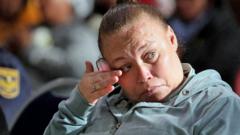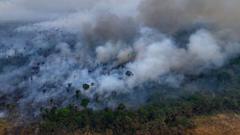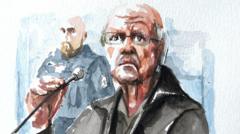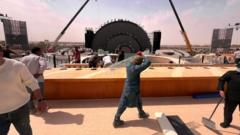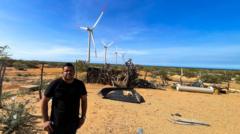Survivors of the 2015 Mariana dam collapse, which claimed 19 lives and devastated communities in Brazil, are pursuing justice in a UK court against BHP. Personal stories reveal the deep emotional scars left behind, as the struggle continues for fair compensation and recognition of the tragedy's toll on their lives.
Seeking Justice: Survivors of Brazil's Mariana Dam Disaster Begin Legal Battle Against BHP
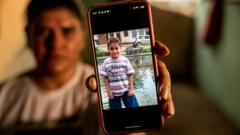
Seeking Justice: Survivors of Brazil's Mariana Dam Disaster Begin Legal Battle Against BHP
As a trial unfolds in the UK, victims and families affected by the Mariana dam disaster confront not only their grief but also corporate accountability.
Gelvana Rodrigues’s heart-wrenching account of losing her seven-year-old son, Thiago, during the Mariana dam disaster exemplifies the profound impact of the catastrophic event that occurred on November 5, 2015, in Minas Gerais, Brazil. A toxic mudslide released from the dam, owned by Samarco—a partnership between mining giants Vale and BHP—claimed 19 lives and obliterated local homes, marking it as Brazil's most disastrous environmental event.
While Gelvana was at work that fateful day, Thiago was at home with his grandmother when the dam burst, unleashing millions of cubic meters of toxic sludge that swept through their community. Gelvana vividly remembers the desperate three-day search that followed, culminating in the devastating news that rescuers had found her son’s body. “That day my life ended, because I lived for him,” she reflects.
Today, Gelvana finds herself among approximately 620,000 individuals seeking justice through a civil trial against BHP in the UK, set to begin on October 21. The legal proceedings hinge on whether the company can be held liable for the disaster that altered countless lives. The plaintiffs’ legal team successfully argued for the trial to take place in London based on BHP's headquarters’ presence in the UK at the time of the collapse. Should the company be found liable, a secondary phase will establish damages owed to the victims.
This legal confrontation is parallel to another trial against Vale, occurring in the Netherlands, where about 70,000 plaintiffs are also seeking restitution. Both corporations have agreed to share the financial responsibility should either be found guilty of negligence.
Marcos Muniz, affectionately known as Marquinhos, relocated to Bento Rodrigues at just six years old, later building his own home on land inherited from his father. After spending nearly 30 years working for Samarco, Marquinhos never envisioned the calamity that would erase his town, which now lies buried under thick mud—only remnants of his home are visible above a nearby lake's surface.
Despite a compensation effort led by the Renova Foundation—established by BHP and Vale—many survivors express frustration. The foundation reports over $7.7 billion distributed to 445,000 individuals, yet it emphasizes that these payments do not imply corporate accountability for the disaster. Resettlement plans in a new city, Novo Bento, offer hope of recovery for some, but many, like Marquinhos, feel their identities and communities are irreparably altered.
Darliza das Graças, who transitioned from running a bar in the old Bento Rodrigues to operating a restaurant in Novo Bento, shares mixed feelings about her change of environment, stating that while life has improved, the sense of community has diminished. With ongoing legal actions against BHP, affected families remember the haunting losses that transcend monetary compensation.
As the trial approaches, the echoes of sorrow linger. Gelvana's poignant reminder resonates: “Nothing can bring a life back,” as she continues to advocate for justice in hopes of sparing other mothers from similar heartache.








